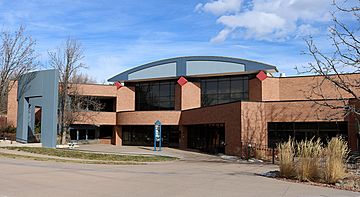Arvada Center for the Arts and Humanities facts for kids

The Arvada Center's main entrance area.
|
|
| Established | 1976 |
|---|---|
| Location | 6901 Wadsworth Blvd. Arvada, Colorado |
| Type | Arts center |
The Arvada Center for the Arts and Humanities is a fun and exciting place in Arvada, Colorado. It's a special center where people can enjoy art, learn new skills, and watch amazing performances. This non-profit center first opened its doors in 1976.
The Arvada Center has many different parts. It includes the Arvada History Museum, three theaters for plays and concerts, and large art galleries. There are also rooms for music, dance, and theater practice. You can find classrooms, a conference area, and an outdoor amphitheater too.
Contents
What You Can Do at the Arvada Center
The Arvada Center is a big cultural spot in the Denver area. It's one of the largest theater companies in Colorado. This center offers many ways to explore your creative side.
Classes and Workshops
The center provides classes in both visual arts and performing arts. This means you can learn to paint, draw, sculpt, or even act and dance! These classes are open to people of all ages.
Live Performances and Shows
The Arvada Center is well-known for its summer theater program. This program features many different stage plays and musicals. Both groups run by the center and independent companies perform here. It's a great place to see live shows.
Music for Young Musicians
The center is also home to the Front Range Youth Symphony Orchestra. This orchestra gives school-age students a chance to play music together. It has been helping young musicians for over ten years.
Growing Bigger: The Center's Expansions
After the Arvada Center first opened, it quickly became very popular. More space was needed to fit all the activities and visitors.
First Big Expansion
In 1992, a major expansion project was approved. This project almost doubled the size of the entire center. It added much-needed room for all the different programs.
More Space for Art and Learning
Another expansion was approved in December 2002. This project was designed to make the center even larger and better. It was planned to happen in different stages.
The first stage of this expansion finished a small theater that started in 1992. It also made the ballroom bigger, so it could hold more people. More storage space was added for events and for the performing arts. The history museum also got more exhibition space. The inside of the center was updated, and the outdoor lighting and signs were improved.
The second stage of the expansion was completed in 2006. This phase added a new shop for creating theater sets and costumes. It also included special rehearsal rooms and dressing rooms for performers. Outside, new patios and gathering spots were created for visitors to enjoy. The art gallery and history museum also grew larger. More restrooms were added, and the landscaping was improved. They even added 60 new parking spaces!
The third stage of this expansion was completed by 2018.

